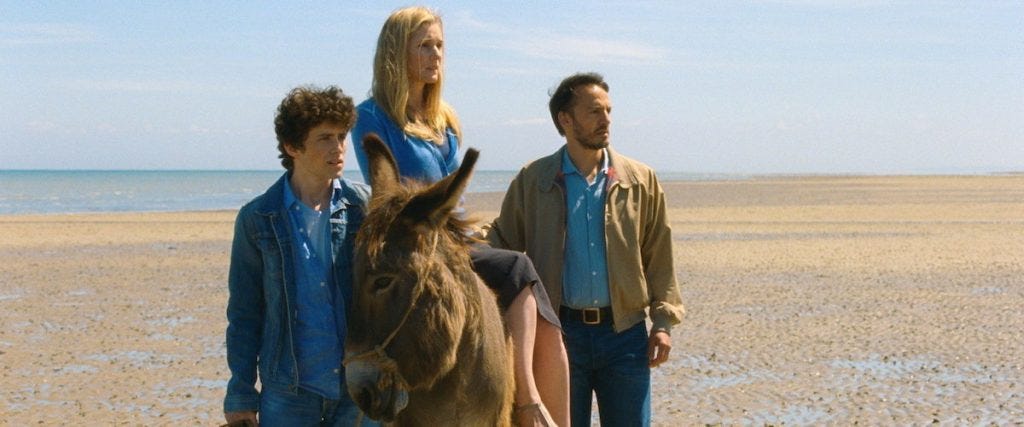NYFF: Notes on Atarrabi and Mikelats
Atarrabi and Mikelats is my 3rd film of the New York Film Festival and my 2nd Eugene Green film. I was a big fan of Son of Joseph (2016), so I was excited forward to see Green's latest film. In many ways Attarabi is more of the same, but weirder. Atarrabi and Mikelats are the two sons of the Basque Goddess Mari, who seems to be an earth goddess especially connected to the weather. The film starts with Mari entrusting the education and upbringing of her two sons to the Devil, because he is educated. We fast forward to the sons as young adults. Atarrabi (Saia Hiriart) is naive and innocent and wishes to leave the charge of the Devil and live a godly life. Mikelats (Lukas Hiriart) enjoys his devilish life, and spend most of his time "downstairs" partying with his friends. Atarrabi eventually convinces the Devil to let him leave, but as he does, the Devil steals Atarrabi's shadow. This act proves to have disastrous consequence for Atarrabi who can no longer receive the light of God. This disqualifies him from serving in the priesthood or getting married, and the rest of the movie focuses on Atarrabi's quest to find meaning in a life without God's light.
Green's films, in my experience, are marked by three distinct approaches, which seem at odds with each other. The first is the Baroque declamatory style that his actors employ. For most conversations, characters speak in a clear, fairly emotionless tone. After the first couple of typical shot/reverse shots, the scene switches to centered compositions with each character looking directly into the camera. The effect is unsettling and both pulls the audience into the movie through the direct address and pushes them out through the very deliberate and unnatural style.
The second approach is the use of what might be called sitcom humor. In Atarrabi and Mikelats, the Devil wears a red silk suit and cape. When Atarrabi interrupts the Devil working and listening to headphones, the Devil removes them and says he is listening to rap because it helps him concentrate. Moments later he tells Atarrabi to trust his advice because he went to business school. In the clip featured above, hell is suggestive of a German wine cellar populated by frat boy acrobats who dance around a goat-headed demon.
And finally, the central character is an extremely naive and innocent fool-type character who is unable to cope with the every day demands of the world and yet is solid and courageous in the face of that same impure world. Though Son of Joseph is based in traditional Christianity and Atarrabi and Mikelats is based in Basque mythology, both feature religiously pure protagonists who seem to deserve a straight ascension to heaven.
The challenge for Green, as you might have guessed, is to integrate these disparate approaches into one unified film. Son of Joseph does so successfully. It's not so clear that Atarrabi can replicate the feat. Here the contradictions outweigh the confluences. The Devil and Atarrabi seem to come not only from different films, but from different genres entirely. The tonal shifts between the declamatory style and "I listen to rap because it helps me concentrate" are hard to reconcile. Of course, to his credit, Green also creates beautiful moments including a plea from Atarrabi to his mother to stop the storm she has created at Mikelats request. And the ending, though more subtle, has some of the same sublimity of the ending of Lars von Trier's Breaking the Waves (which have more in common than their surface qualities would indicate). Green's insistence on the possibility of purity and innocence in an increasingly jaded world is enough to give him the benefit of the doubt, though I think these days we're going to need more than purity to survive.



